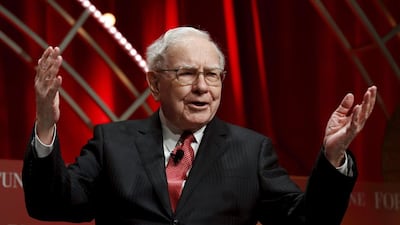Warren Buffett is sitting on more cash than ever.
His Berkshire Hathaway had almost US$85 billion on its books as of September 30, according to a regulatory filing at the weekend. That is up from the previous record of $72.7bn on June 30.
“He’s got a lot of ammo” for investments, said Bill Smead, who oversees about $2.1bn including Berkshire shares at Smead Capital Management. “Eighty-five billion dollars is a lot of money.”
The cash balance is likely to spark a fresh round of speculation about what the 86-year-old Berkshire chairman and chief executive will buy next. Over the past five decades, he has built the Omaha, Nebraska-based company into a sprawling conglomerate through dozens of acquisitions and stock picks. It now has an equity portfolio valued at about $100bn and subsidiaries that range from Dairy Queen to NetJets.
Operating earnings climbed by 6.6 per cent in the third quarter to $4.85bn, or $2,951 a share, driven by contributions from manufacturing businesses. That missed the average $3,058-a-share estimate of three analysts surveyed by Bloomberg. Net income fell by 24 per cent from a year earlier when Mr Buffett booked a large gain on an investment in Kraft Heinz.
This year, he has bought the battery-maker Duracell and Precision Castparts, a global supplier to the aerospace industry. The latter was one of his biggest acquisitions ever.
Those two businesses pushed profit at the manufacturing, service and retail segment up by 45 per cent to $1.7bn in the quarter. Aggregate earnings fell for the rest of the companies in the group, including chemical unit Lubrizol and toolmaker Iscar, according to the filing.
Some of Berkshire’s other large businesses also struggled in the quarter. The insurance group reported that underwriting profit slipped 34 per cent to $272 million as results worsened at the company’s namesake reinsurance business and auto insurer Geico. Income from Berkshire’s railroad, BNSF, fell about 12 per cent to $1.02bn on reduced demand for coal and petroleum products.
One bright spot was the utility unit, Berkshire Hathaway Energy. It contributed $932m in profit, compared with $786m a year earlier, on higher electric rates and increased wholesale volumes. The business operates electric grids in the UK, natural gas pipelines that stretch from the Great Lakes to Texas and power companies in states including Iowa and Nevada.
Part of the increase in cash during the quarter came from the sale of preferred stock in the chewing-gum maker Wrigley. The transaction was completed in late September and drove a gain of $2.35bn on derivatives and investments. A year earlier, Berkshire recorded a gain of $4.88bn in that area because of an increase in the value of its investment in Kraft Heinz.
Berkshire has said such marks are “often meaningless” and do not help in understanding its performance. Nonetheless, they were responsible for the drop in net income, which declined to $7.2bn in the third quarter from $9.43bn a year earlier.
Kraft Heinz, formed by the merger of two US food giants last year, last week posted third-quarter revenue that missed analysts’ estimates after currency fluctuations and sluggish sales in the US and Europe pressured results.
Revenue for the quarter slipped by 1.5 per cent to $6.27bn, missing analysts’ average estimate of $6.3bn. That shined a light on the company’s struggles to expand sales in a changing market, said Ken Shea, an analyst at Bloomberg Intelligence.
“The lack of top-line growth is the only thing to criticise in this report,” Mr Shea said.
Under the management of private equity firm 3G Capital, Kraft Heinz has slashed costs, following the playbook used to produce industry-leading margins at HJ Heinz before its merger with Kraft Foods. The combined group has closed factories and cut jobs as it pursues $1.5bn in cost cuts amid sluggish sales. The company is ahead of schedule on its savings programme.
Profit excluding some items rose 89 per cent to 83 cents a share, in part because of lower taxes and debt payments, the Pittsburgh-based company said.
Not all the $84.8bn in cash at Berkshire is available for investments. Mr Buffett has said that he wants to keep a cushion of at least $20bn. His company is a major seller of reinsurance, a business that requires large payouts after natural disasters and other catastrophic events.
One of the best ways for Mr Buffett to deploy the cash pile could be to purchase his company’s stock, said Jim Shanahan, an analyst at Edward Jones. Mr Buffett is authorised to buy back shares for less than 120 per cent of book value, but the company could adjust that limit.
As of September 30, book value stood at $163,783 per share. Berkshire’s Class A stock closed on Friday at $214,545, or about 31 per cent more than the measure of assets minus liabilities.
Even at that level, the stock “seems really cheap to me”, Mr Shanahan said. “There’s a lot of upside here in terms of earnings.”
* Bloomberg
business@thenational.ae
Follow The National's Business section on Twitter

